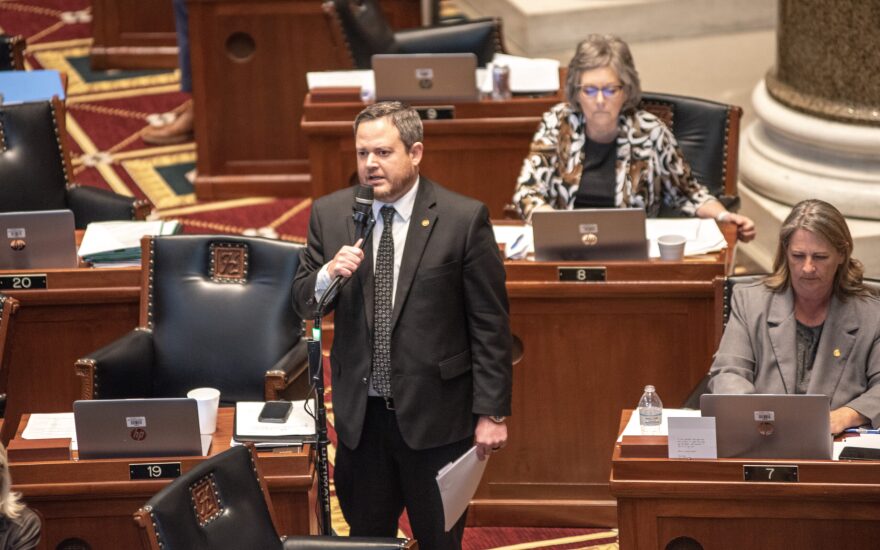Missouri advocates scored a victory during this year's legislative session with the elimination of non-disclosure agreements in child sex abuse cases. But the internal politics of the Capitol spelled doom for another high-profile bill seeking to extend the time victims have to file lawsuits.
It was the third year in a row that legislation to extend the civil statute of limitations for victims of childhood sexual abuse advanced but failed to pass. Proponents blame powerful industry lobbyists and internal politicking for killing a proposal that for years has garnered bipartisan support.
"I've never received a 'no' vote on that legislation ever," said state Rep. Brian Seitz, a Republican from Branson and the bill's House sponsor. "So you would think it would just make it straight through the House of Representatives, the Senate and go to the governor's desk."
State Sen. Brad Hudson, a Cape Fair Republican who also sponsored the proposal, said he'll fight for the bill again next year.
"I firmly believe that if we don't do something about our laws in Missouri," he said, "we are going to become a sanctuary state for pedophiles."
Victims currently only have until age 31 to file suit, which advocates argue is not long enough, especially because of the often-delayed nature of disclosure. Missouri is one of 18 states where the statute of limitations is set at an age under 35, and dozens of states in recent years have moved to extend or eliminate the statute of limitations for these cases.
Seitz pointed to opposition from insurance lobbyists, who argued giving victims more time to sue would increase their liability, and tort reform advocates who oppose expanding the ability to file lawsuits. Seitz's bill expanding the statute of limitations for childhood abuse claims was eventually added as an amendment to a controversial bill narrowing the statute of limitations on personal injury claims.
"In the Missouri Capitol, there's a power structure," Seitz said. "At the top are the lobby groups. Secondarily, the bureaucrats. Thirdly, the leadership of either party. Fourth, the House and Senate. And fifth, the janitor. And that's the difficulty with getting common sense legislation through, is, does it have lobby backing? Is there lobby money behind it? Is there opposition from a lobby group?"

Seitz believes his bill was added to the more controversial tort reform legislation as leverage to get that measure out of the House, calling it a "political football."
At the time, lawmakers acknowledged the dynamic.
"The problem I have with this is the amendment is so good," said state Rep. David Tyson Smith, a Democrat from Columbia, when Seitz's bill was added as an amendment in February to the tort reform bill, which was sponsored by Republican state Rep. Matthew Overcast from Ava. "I may have to vote 'present' on this because of the great amendment that's on this. And I know that, probably, there's a strategy behind that."
A spokesperson for the Missouri Insurance Coalition said by email that the organization "worked constructively with Representative Seitz to incorporate clarifying language" after concerns were raised in the debate over Overcast's bill about whether the childhood statute of limitations could be unintentionally affected.
A spokesperson for the American Tort Reform Association said the group opposed the original legislation because it would've retroactively allowed people to file lawsuits that are currently too old to bring under existing law. The group dropped its opposition when that provision was dropped. The negotiated language also would have only raised the statute of limitations by ten years rather than eliminating it entirely.
Overcast, who sponsored the personal injury statute of limitations bill, declined to answer questions about how his proposal and Seitz's came to be linked.
"Rep. Seitz and I agree on many issues, especially when it comes to protecting survivors and ensuring justice," he said in an email.
The Missouri Chamber of Commerce and Industry testified against the bill in a Senate committee hearing. A spokesperson declined to comment.
Seitz said he hopes next year the bill can advance as a standalone measure.
"We're going to push this forward next year. I want it running as a single issue bill," he said. "I don't want it to be a political football to pass someone else's legislation."
Seitz has said the bill was inspired in part by abuse that took place at the Branson-based Kanakuk Kamps.
Kanakuk director Pete Newman pleaded guilty in 2010 to seven counts of sexual abuse, and the prosecutor said Newman's victim count might be in the hundreds.
Newman is currently serving two life sentences plus 30 years in prison.
Kanakuk leadership maintains that they had no advanced knowledge of his behavior, and Newman was a "master of deception."
Elizabeth Phillips has been traveling from Texas to advocate for an extension of the childhood sex abuse statute of limitations, along with the bill to void NDAs.
Phillips' brother, Trey Carlock, reached a settlement with Kanakuk after being abused by Newman, and died by suicide at age 29.
She said she was glad the bill got a Senate hearing this year which felt like "momentum like never before" — but she'll be traveling back again next year.
"Missouri will have to ultimately decide, and the legislature will ultimately have to decide," she said, "do they stand with liable institutions who are responsible for the abuse of children, or have been negligent in those cases, or do they want to stand the survivors and get these predators out of their state?"
This story was originally published by Missouri Independent.
Copyright 2025 KCUR 89.3


